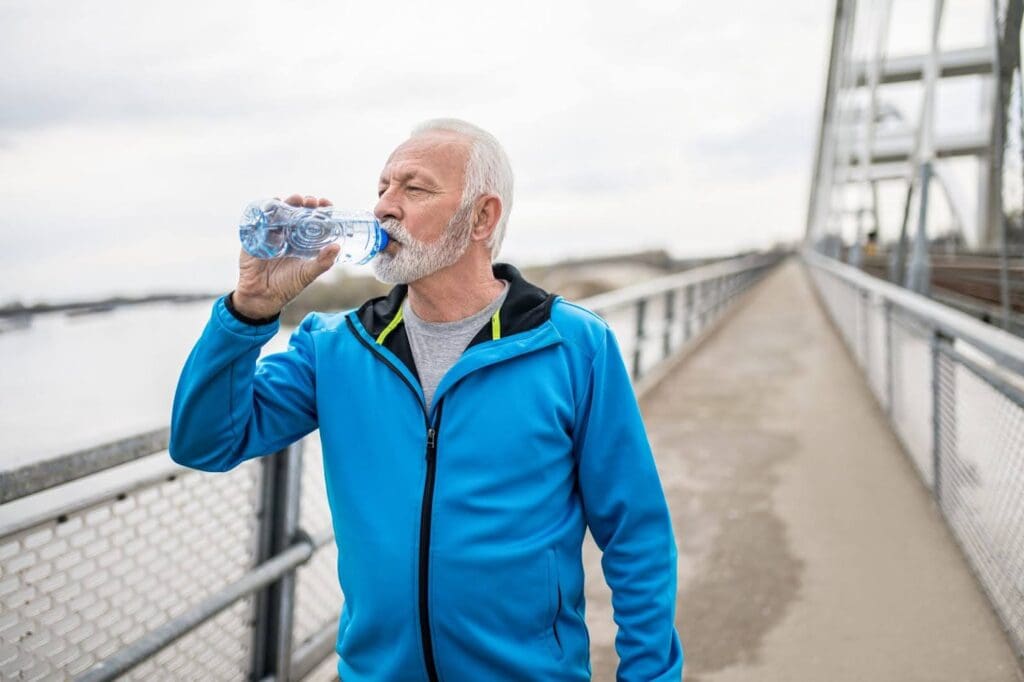Dehydration in Seniors: Risks, Signs, and Prevention Tips
Date: June 04, 2024 | Article | Reading Time: 6 minutes
Did you know that something as simple as drinking enough water can make a world of difference in your health and how you feel? From protecting your kidneys to preventing falls, keeping well-hydrated impacts your body from head to toe.
Let’s dive into the importance of hydration, how to watch out for signs of dehydration, and explore some simple ways to make drinking water more enjoyable.
Why Are Older Adults More Prone to Dehydration?
As we get older, our bodies naturally undergo changes that can make us more susceptible to dehydration. Here’s why:
Thirst Signals Can Fade
Our sense of thirst might not be as strong as it once was. This means some seniors may not realize they need fluids even when their bodies are starting to run low.
Less Fluid Reserve
Over time, the percentage of water in our bodies naturally decreases. This gives us a smaller reserve to draw from, making it easier to become dehydrated if we’re not careful.
Medication Matters
Many common medications for conditions like high blood pressure (such as diuretics) can increase fluid loss through urination. That’s why it’s important to be aware of any side effects of medication and stay hydrated.
Important Note: Dehydration can become serious quickly, especially for older adults. If you’re concerned about yourself or a loved one, please seek medical attention as soon as possible. Severe dehydration may require urgent care.
What Are the Signs of Dehydration in Seniors?
Recognizing potential signs of dehydration early on can help you or your loved one get the fluids needed to feel better. Here’s what to watch for, ranging from mild to more concerning:
Mild to Moderate Dehydration:
- Increased thirst
- Dry or sticky feeling in the mouth
- Urinating less often than usual
- Dark yellow urine
- Tiredness or feeling sluggish
- Headaches
- Feeling dizzy or a bit unsteady
Severe Dehydration:
- Extreme thirst
- Very dry skin
- Urinating very little or not at all
- Sunken eyes
- Low blood pressure
- Rapid heartbeat
- Feeling confused, disoriented or even experiencing delirium
- Muscle weakness and cramps

The Benefits of Staying Hydrated
Drinking enough water isn’t just about feeling better at the moment; it has long-term benefits for healthy aging and well-being. Here are just some of the ways proper hydration makes a difference:
Kidney Function Support
Our kidneys work hard, and staying hydrated helps them filter waste efficiently. This is especially important as kidney function naturally slows with age, making older adults more prone to kidney disease.
Reduced Fall Risk
Dehydration can lead to dizziness, lightheadedness, and low blood pressure – all major risk factors for falls in older adults. Proper hydration helps maintain balance and keeps you feeling stable.
Medication Effectiveness and Side Effect Mitigation
Many medications seniors take interact with hydration levels. Drinking enough water helps ensure medications work optimally while reducing the risk of side effects like constipation (often caused by diuretics).
Chronic Disease Management
Staying hydrated can be helpful in managing conditions common among seniors, including diabetes and heart disease.
Sharper Cognition
Dehydration dulls your focus. Proper hydration supports brain function, enhancing your mood and mental clarity.
Mood and Energy Boost
Older adults are more susceptible to fatigue and low mood. Staying hydrated can improve your energy levels and reduce irritability.
Bladder Health
Maintaining proper fluid intake can reduce the frequency of urinary tract infections (UTI), a common issue for many older adults.
Stronger Immune Function
Proper hydration supports your body’s ability to fight off illness – something we all need as we get older.
Tips To Prevent Dehydration
Here’s a collection of tips created to make staying hydrated easier and more enjoyable for older adults:
- Create Reminders: Set gentle reminders on your phone or use a fun water-tracking app to help you sip throughout the day.
- Use Visual Cues: Keep a water bottle or a pretty glass of water right where you’ll see it – on the nightstand, next to your favorite chair or on the kitchen counter.
- Build a Routine: Have a glass with each meal, take a “water break” when you take any medications, or simply make it a point to drink a bit of water at the top of each hour.
- Flavor Boost: Give your water a refreshing twist! Add a few slices of citrus fruits, fresh cucumber, berries or even a sprig of your favorite herbs.
- Options: Water isn’t the only solution – consider low-sugar sports drinks, diluted fruit juices, decaffeinated tea, and even flavorful broths as part of your hydration strategy.
- Water-Rich Foods: Include fruits and vegetables high in water content in your diet, like watermelon, strawberries, cucumbers, lettuce, and celery.
- Talk to Your Doctor: Review your medications to see if any increase your risk of dehydration, and discuss any concerns about fluid retention that might require specific adjustments to your plan.
A Special Note on Dehydration in Seniors With Dementia
Dementia presents unique challenges when it comes to preventing dehydration. Memory loss can cause seniors to forget to drink regularly, make it difficult to recognize where drinks are available, or even interfere with the steps involved in getting a drink (like using a faucet).
As dementia progresses, your loved one may develop dysphagia, which affects muscle control involved in swallowing and may lead to a fear of choking on liquids. These challenges underscore the importance of finding creative solutions to help your loved one stay hydrated.
Strategies for hydration success:
- Hydration Stations: Set up small drink stations around your home in frequently used areas with easy-to-access cups and their favorite drinks, plus visual reminders.
- Offer Fun Foods: Smoothies with fruit and yogurt, milkshakes with added nutritional supplements, and ice cream offer a different flavor experience and can significantly contribute to fluid intake.
- Adjusting Temperature: Sometimes, a cool beverage is more appealing than room temperature water, or vice versa. Experiment with different temperatures to find their preference.
- Make Hydrating a Social Activity: Enjoy conversations with your loved one. Offer flavored waters or infused teas for a social and stimulating way to incorporate additional liquids.
- Colored Cups: Drinks are easier to see (and more enticing) in brightly colored cups that contrast with the table or countertop. Red or yellow cups often work best.
Every person with dementia is unique. Observe what works for your loved one and tailor your approach accordingly. Don’t hesitate to reach out to their healthcare team or explore memory care for further support and personalized strategies.

Refresh Your Retirement Lifestyle at The Delaney® at The Vale
At The Delaney® at The Vale, we believe wellness should flow as naturally as water. Our community offers a vibrant environment, abundant amenities, and personalized support to help you thrive on every level. Discover the refreshing lifestyle that awaits – contact our team online or call 781-417-5765 to schedule your personal visit and experience a world of possibilities at the Delaney.
